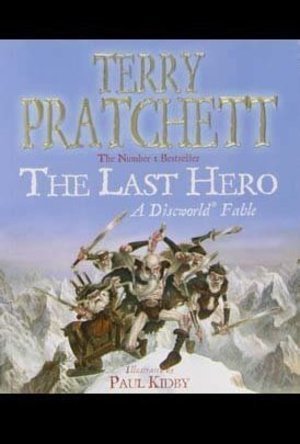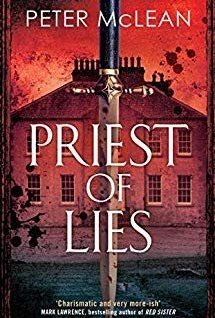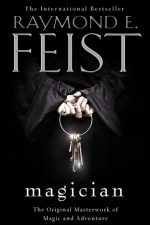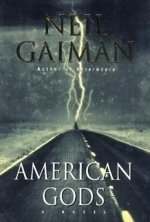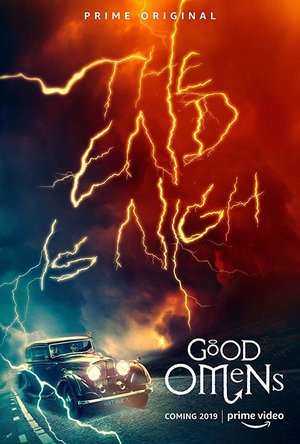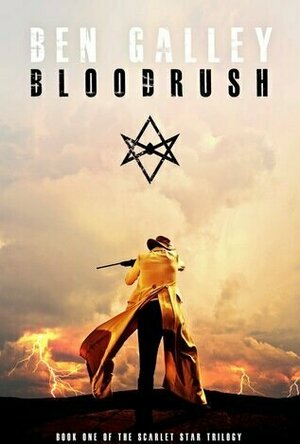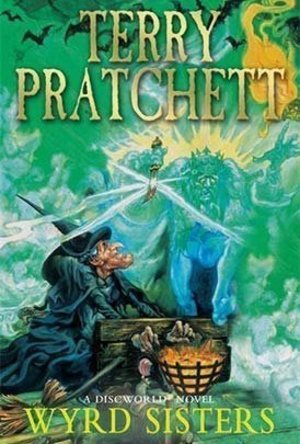Search
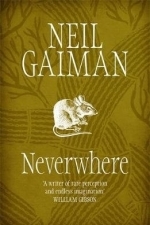
Neverwhere
Book
Neverwhere is the stunningly original first novel from Neil Gaiman, the bestselling and prizewinning...
Fantasy
David McK (3721 KP) rated The Last Hero (Discworld, #27; Rincewind #7) in Books
Jan 28, 2019
<i>Fable (noun): a story about supernatural or extraordinary persons or incidents; legend: the fables of gods and heroes.
[from http://dictionary.reference.com]</i>;
This short story by Terry Pratchett ticks all those boxes with the blurb on my edition reading:
"He's been a legend in his own lifetime.
He can remember the great days of high adventure.
He can remember when a hero didn't have to worry about fences and lawyers and civilisation.
He can remember when people didn't tell you off for killing dragons.
But he can't alwyas remember, these days, where he put his teeth ...
He's not really happy about that bit.
.... He's going to climb the highest mountain in the Discworld and meet his gods. He doesn't like the way they let men grow old and die ... "
What ensues is, by the standards of Discworld novels, perhaps a return to the earlier novels that featured the gods (and Cohen the Barbarian) more prominently than the more recent. Also involved prominently in this story are the Wiz(z)ard Rincewind, Captain Carrot and Leonard of Quirm, with that latter character given more of a role than in the few previous he has been in (excepting, maybe, Jingo).
This is also unusual in that it is an illustrated story: whereas I've always found illustrations to be inferior to imagination when it comes to visualising events and characters, it does add an extra layer to this story - particularly where it concerns Leonard's creations.
[from http://dictionary.reference.com]</i>;
This short story by Terry Pratchett ticks all those boxes with the blurb on my edition reading:
"He's been a legend in his own lifetime.
He can remember the great days of high adventure.
He can remember when a hero didn't have to worry about fences and lawyers and civilisation.
He can remember when people didn't tell you off for killing dragons.
But he can't alwyas remember, these days, where he put his teeth ...
He's not really happy about that bit.
.... He's going to climb the highest mountain in the Discworld and meet his gods. He doesn't like the way they let men grow old and die ... "
What ensues is, by the standards of Discworld novels, perhaps a return to the earlier novels that featured the gods (and Cohen the Barbarian) more prominently than the more recent. Also involved prominently in this story are the Wiz(z)ard Rincewind, Captain Carrot and Leonard of Quirm, with that latter character given more of a role than in the few previous he has been in (excepting, maybe, Jingo).
This is also unusual in that it is an illustrated story: whereas I've always found illustrations to be inferior to imagination when it comes to visualising events and characters, it does add an extra layer to this story - particularly where it concerns Leonard's creations.
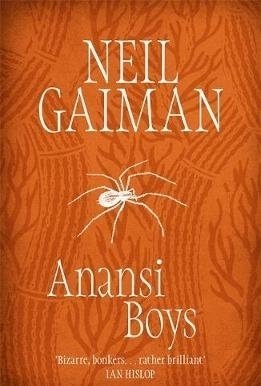
Anansi Boys
Book
From bestselling storytelling legend Neil Gaiman, author of American Gods and The Ocean at the End...
Ross (3284 KP) rated Priest of Lies in Books
Jun 26, 2019
Fantastically grim, gritty sequel
*I received a free advance copy of this book from NetGalley and the publishers in exchange for an honest review*
Priest of Bones was one of my favourite books of last year. I loved the narrative style, the dark tone and the simple yet thrilling storyline. The returning conscripts using their newly learned military tactics to take back their streets and run their gangland empires was a clever, honest and hard-hitting story. It really was "peaky blinders with swords".
The follow-up continues in that vein, the Pious Men gang have consolidated their hold in Ellinburg and are now at full-on gang war. However, as they returned from war, so does a large number of other former gangsters, and a number of new/revived gangs compete for territory.
The fantasy tone is still used here, despite being the mystical, noble pursuit we are used to. I seriously love Mclean's narrative voice, his action scenes and his overall pace of writing.
I was thrilled to see in the Q&A at the end of the book that I was right in thinking Ellinburg was based loosely on Edinburgh.
The feel of this book is very much a grim and nasty version of Terry Pratchett's Guards series, with characterisation and scene setting to rival Pratchett at his best.
A truly immersive compelling read that I loved from start to finish.
Priest of Bones was one of my favourite books of last year. I loved the narrative style, the dark tone and the simple yet thrilling storyline. The returning conscripts using their newly learned military tactics to take back their streets and run their gangland empires was a clever, honest and hard-hitting story. It really was "peaky blinders with swords".
The follow-up continues in that vein, the Pious Men gang have consolidated their hold in Ellinburg and are now at full-on gang war. However, as they returned from war, so does a large number of other former gangsters, and a number of new/revived gangs compete for territory.
The fantasy tone is still used here, despite being the mystical, noble pursuit we are used to. I seriously love Mclean's narrative voice, his action scenes and his overall pace of writing.
I was thrilled to see in the Q&A at the end of the book that I was right in thinking Ellinburg was based loosely on Edinburgh.
The feel of this book is very much a grim and nasty version of Terry Pratchett's Guards series, with characterisation and scene setting to rival Pratchett at his best.
A truly immersive compelling read that I loved from start to finish.
The first novel (later broken into 2 parts?) in Raymond e feist's so-called Riftwar saga; this definitely falls under what I term as epic fantasy as it spans more than a decade, and all the political and personal changes that occur during that time of war, complete with ye olde 'person of unknown origin finding their place in the world'.
You know, the way a lot of fatnsy stories do? Think Luke Skywalker, from the back-planet of Tattoine, or Frodo Baggins from Bagend, to name but two.
Rags to riches, basically.
Anyway, perhaps the key protagonist of this is the keep boy Pug, who, over the course of the story - finds himself a native of two worlds - that's where the 'Rift' from Riftwar comes in, as a magical rift in space connects them - during a time of war between those two planes.
He's not the only protagonist; just the main one - there's also his childhood friend Tomas, the princes Arutha and Lyam, the princess Carline, the magician Kulgan - but Pug is, to my mind, the key character, with most of those other characters introduced through their relationship to him.
Others have commented on the writing style employed by Feist - it may seem 'basic', however that in itself is no bad thing (and, remember, this book is now decades old) as Feist gives you just enough information to envisage your own world. A bit more, perhaps, than the thumbnail sketches of Terry Pratchett (incidentally, one of my favourite authors), but nowhere near the level of detail that JRR Tolkien that could make The Lord of The Rings, well, a bit of a slog at times!
You know, the way a lot of fatnsy stories do? Think Luke Skywalker, from the back-planet of Tattoine, or Frodo Baggins from Bagend, to name but two.
Rags to riches, basically.
Anyway, perhaps the key protagonist of this is the keep boy Pug, who, over the course of the story - finds himself a native of two worlds - that's where the 'Rift' from Riftwar comes in, as a magical rift in space connects them - during a time of war between those two planes.
He's not the only protagonist; just the main one - there's also his childhood friend Tomas, the princes Arutha and Lyam, the princess Carline, the magician Kulgan - but Pug is, to my mind, the key character, with most of those other characters introduced through their relationship to him.
Others have commented on the writing style employed by Feist - it may seem 'basic', however that in itself is no bad thing (and, remember, this book is now decades old) as Feist gives you just enough information to envisage your own world. A bit more, perhaps, than the thumbnail sketches of Terry Pratchett (incidentally, one of my favourite authors), but nowhere near the level of detail that JRR Tolkien that could make The Lord of The Rings, well, a bit of a slog at times!
Cynthia Armistead (17 KP) rated American Gods in Books
Mar 1, 2018
I'm trying to remember whether or not I've read any of Gaiman's other novels before, and I'm fairly certain that I haven't. I read [b:Good Omens|12067|Good Omens|Terry Pratchett|http://photo.goodreads.com/books/1266659394s/12067.jpg|4110990], but that was co-written with [a:Terry Pratchett|1654|Terry Pratchett|http://photo.goodreads.com/authors/1235562205p2/1654.jpg], and the collaboration was genius. I know that the entire world seems to love Sandman, of course, but I'm just not a fan of graphic novels. In fact, it took me a while to realize that the Good Omens co-author and the Sandman author were one and the same.
I've certainly read some short stories, too. The most memorable, <a href="http://en.wikipedia.org/wiki/Snow,_Glass,_Apples">"Snow, Glass, Apples"</a> was reprinted in an anthology I read recently. I find it disturbing, so I won't re-read it. Well-written, of course—it wouldn't be so very memorably distressing if it weren't so masterfully done! (I found the <a href="http://www.holycow.com/dreaming/stories/snow-glass-apples">text online</a> if you care to read it, but please understand that the story deals with pedophilia, necrophilia, and incest here. It is the polar opposite of all things Disney.) Snow White was never one of of my favorite fairy tales, and Gaiman definitely pushed it much farther down the list.
In any case, I don't know what I was expecting from Gaiman, but <i>American Gods</i> wasn't it. I like stories with happy endings, and within the first few chapters I was fairly sure that there wouldn't be one. Is Gaiman fundamentally opposed to joy, or is it just happiness that he doesn't allow?
The novel is epic. It is masterful. All that stuff from the big critics is dead on. The book could be used as the backbone of a mythological scavenger hunt if a teacher were willing to run a very unstructured but engaging course that way. I certainly enjoyed that aspect of it, and it made me glad that I was reading it on my iTouch so that I could look up anything I liked online at any time, no matter where I happened to be (which was almost always at home or somewhere else that had wifi access, happily).
I seldom want to see illustrations in any book, but yes, I think I would like to see good pictures of some of the characters Gaiman described in this one. On the other hand, without artwork I spent time imagining what the characters looked like based on the descriptions. I don't normally stop to do that, as such matters as seldom relevant to a plot, but these beings caught my fancy. Not enough that I would sit through an entire graphic novel, I'm afraid, but if I saw one now I might flip through it to see how the artist's renderings compare with my versions.
I'm seldom able to identify an overall Theme to the books I read. Most of them, honestly, are fluff. I'm fine with that. I read them because they entertain me. <i>American Gods</i> is different. It is entertaining, but it isn't light or fluffy in the least. It definitely has an easily identifiably Theme and Tropes and all those elements that I recall from long-ago classes, the sorts of things that put me off from my original English major because I hated tearing other author's works apart instead of writing anything original. (Now, I begin to understand that we were being taught to recognize what makes for good writing so we might have some hope of possibly creating some of it one day.)
I somewhat timidly conclude that <i>American Gods</i> is the first piece of Literature I've read in a very long time, and well worth the time spent reading it. (I find it rather amusing that it would be British Literature, despite its title, due to the author's nationality.) I'm not going to state the theme, because that would be a spoiler, and I hate putting those in reviews—but it's something that I see as a Truth, and one that needs to be stated far more often, especiallly today. It's even more interesting that it took a Brit to say it.
The book is dark, although it does have some very bright spots in it. I will acknowledge that I was going through a particularly bad time with regards to my health when I was reading it, but I still think it might be best for some people to read this one when in a fairly positive state of mind.
I've certainly read some short stories, too. The most memorable, <a href="http://en.wikipedia.org/wiki/Snow,_Glass,_Apples">"Snow, Glass, Apples"</a> was reprinted in an anthology I read recently. I find it disturbing, so I won't re-read it. Well-written, of course—it wouldn't be so very memorably distressing if it weren't so masterfully done! (I found the <a href="http://www.holycow.com/dreaming/stories/snow-glass-apples">text online</a> if you care to read it, but please understand that the story deals with pedophilia, necrophilia, and incest here. It is the polar opposite of all things Disney.) Snow White was never one of of my favorite fairy tales, and Gaiman definitely pushed it much farther down the list.
In any case, I don't know what I was expecting from Gaiman, but <i>American Gods</i> wasn't it. I like stories with happy endings, and within the first few chapters I was fairly sure that there wouldn't be one. Is Gaiman fundamentally opposed to joy, or is it just happiness that he doesn't allow?
The novel is epic. It is masterful. All that stuff from the big critics is dead on. The book could be used as the backbone of a mythological scavenger hunt if a teacher were willing to run a very unstructured but engaging course that way. I certainly enjoyed that aspect of it, and it made me glad that I was reading it on my iTouch so that I could look up anything I liked online at any time, no matter where I happened to be (which was almost always at home or somewhere else that had wifi access, happily).
I seldom want to see illustrations in any book, but yes, I think I would like to see good pictures of some of the characters Gaiman described in this one. On the other hand, without artwork I spent time imagining what the characters looked like based on the descriptions. I don't normally stop to do that, as such matters as seldom relevant to a plot, but these beings caught my fancy. Not enough that I would sit through an entire graphic novel, I'm afraid, but if I saw one now I might flip through it to see how the artist's renderings compare with my versions.
I'm seldom able to identify an overall Theme to the books I read. Most of them, honestly, are fluff. I'm fine with that. I read them because they entertain me. <i>American Gods</i> is different. It is entertaining, but it isn't light or fluffy in the least. It definitely has an easily identifiably Theme and Tropes and all those elements that I recall from long-ago classes, the sorts of things that put me off from my original English major because I hated tearing other author's works apart instead of writing anything original. (Now, I begin to understand that we were being taught to recognize what makes for good writing so we might have some hope of possibly creating some of it one day.)
I somewhat timidly conclude that <i>American Gods</i> is the first piece of Literature I've read in a very long time, and well worth the time spent reading it. (I find it rather amusing that it would be British Literature, despite its title, due to the author's nationality.) I'm not going to state the theme, because that would be a spoiler, and I hate putting those in reviews—but it's something that I see as a Truth, and one that needs to be stated far more often, especiallly today. It's even more interesting that it took a Brit to say it.
The book is dark, although it does have some very bright spots in it. I will acknowledge that I was going through a particularly bad time with regards to my health when I was reading it, but I still think it might be best for some people to read this one when in a fairly positive state of mind.
Sarah (7800 KP) rated Good Omens in TV
Aug 25, 2019
Could’ve been better
I love Terry Pratchett and Neil Gaiman, but yet I’ve never read Good Omens. The book is next on my to read list, but I thought I’d give the show a go first and in the main, I did enjoy it.
The best thing about this show is by far the interactions between Aziraphale and Crowley, and the performances of Michael Sheen and David Tennant. They’re so much fun and this is where virtually all of the laughs in this show come from. They’re a great pairing, even if they are a little over the top at times, and my favourite episode by far was the one that showed their interactions over the ages. It’s the rest of the plot that I feel let’s this show down a little bit. There are some wonderful cameos from a whole host of stars, and Jon Hamm was great if a little underused. I would’ve loved to have seen more of him. However I really wish they hadn’t cast Jack Whitehall, I don’t get his appeal as he’s an horrendous actor and rather irritating.
The problem though is that despite this show being about the Antichrist and the end of the world, the ending itself is rather lacklustre and whilst everyone wants to stop (or start) the end of the world, the urgency and tension and terror is all too lacking. I get that this is meant to be humorous, but it can still be funny and threatening in the same episode. I actually think they could’ve done without the whole end of the world thing and just had buddy type show with Aziraphale and Crowley that would’ve been just as or even more entertaining. I’m intrigued now to see how this plays out in the book and if it works better.
The best thing about this show is by far the interactions between Aziraphale and Crowley, and the performances of Michael Sheen and David Tennant. They’re so much fun and this is where virtually all of the laughs in this show come from. They’re a great pairing, even if they are a little over the top at times, and my favourite episode by far was the one that showed their interactions over the ages. It’s the rest of the plot that I feel let’s this show down a little bit. There are some wonderful cameos from a whole host of stars, and Jon Hamm was great if a little underused. I would’ve loved to have seen more of him. However I really wish they hadn’t cast Jack Whitehall, I don’t get his appeal as he’s an horrendous actor and rather irritating.
The problem though is that despite this show being about the Antichrist and the end of the world, the ending itself is rather lacklustre and whilst everyone wants to stop (or start) the end of the world, the urgency and tension and terror is all too lacking. I get that this is meant to be humorous, but it can still be funny and threatening in the same episode. I actually think they could’ve done without the whole end of the world thing and just had buddy type show with Aziraphale and Crowley that would’ve been just as or even more entertaining. I’m intrigued now to see how this plays out in the book and if it works better.
Ross (3284 KP) rated Good Omens in TV
Jul 4, 2019
Broadly fine
I am a long-time fan of Terry Pratchett, and a more recent fan of Neil Gaiman, and yet it was only the release of the TV series that prompted me to finally read their joint effort. I thought the book was pretty good, lots of nice silly little jokes spread about, and a good plot keeping up momentum throughout.
I felt the TV series let the book down a little bit. While the overall story and the dialogue, in the main, is true to the book, I felt a lot of it fell flat. A lot of the humour (which comes in the form of charming asides, generally in the narrative of the book) missed the mark and just did not land properly. I did like the expanded section on Azirafale and Crowley's efforts through time, though I think they laboured it too long on the angel's unwillingness and didn't quite show how much they had worked together.
Tennant played Bill Nighy playing a demon, Sheen played David Mitchell playing an angel and they were broadly fine but didn't really sit perfectly for my liking. The rest of the cast were pretty strong (with the exception of Jack Whitehall who I utterly detest and don't think he can act for toffee).
The special effects were on the poor side, but that is only compared to the major big-budget TV shows like GoT and The Walking Dead. The physical effects were excellent.
In all, I am glad they restricted the series to a small number of episodes and did not try and drag it out too long. The ending was not given the build-up it deserved, there really wasn't enough peril before the two single acts that stopped the end of the war (Pulsifer and Adam).
I was very happy to see the relationship between Azirafale and Crowley develop beyond friendship
I felt the TV series let the book down a little bit. While the overall story and the dialogue, in the main, is true to the book, I felt a lot of it fell flat. A lot of the humour (which comes in the form of charming asides, generally in the narrative of the book) missed the mark and just did not land properly. I did like the expanded section on Azirafale and Crowley's efforts through time, though I think they laboured it too long on the angel's unwillingness and didn't quite show how much they had worked together.
Tennant played Bill Nighy playing a demon, Sheen played David Mitchell playing an angel and they were broadly fine but didn't really sit perfectly for my liking. The rest of the cast were pretty strong (with the exception of Jack Whitehall who I utterly detest and don't think he can act for toffee).
The special effects were on the poor side, but that is only compared to the major big-budget TV shows like GoT and The Walking Dead. The physical effects were excellent.
In all, I am glad they restricted the series to a small number of episodes and did not try and drag it out too long. The ending was not given the build-up it deserved, there really wasn't enough peril before the two single acts that stopped the end of the war (Pulsifer and Adam).
I was very happy to see the relationship between Azirafale and Crowley develop beyond friendship
Phil Leader (619 KP) rated Bloodrush (The Scarlet Star Trilogy #1) in Books
Nov 8, 2019
It is hard to describe this book purely because it appears to try to do too much.
It is set in an alternate universe where much is familiar but some things are very different.
It is a western, mostly set in an frontier town in Wyoming with the usual cast of restless townspeople, lone prospectors and ruthless land owners.
It is a fantasy involving faeries and magick
Yet in Galley's capable hands these elements are moulded into a seamless and thrilling story. All the different aspects fit together neatly and consistently producing a terrific platform for the characters and plot.
The main character is 13 year old Tonmerion Hark (known as Merion), son of the Prime Lord (think Prime Minister) of an alternate version of Victorian Britain. When his father is murdered by assailants unknown he is sent to his last remaining relative - an aunt living in Wyoming. Travelling with him is is best friend, a faerie called Rhin who is a fugitive from the rest of the Fae. Desperate to get back to London to find his father's killer and rescue his inheritance, Merion is instead drawn into conflict and underhand dealings in the small town of Fell Falls where is aunt is the undertaker.
The alternate universe is particularly striking. Very nearly everything is familiar but with important differences. The biggest of these is clearly that creatures such as the Fae exist (even if few people have ever seen one) but other changes include the natives of America, the Shohari, not being quite human and a lot of clever differences in London that really make it clear what kind of world Merion inhabits. The magick is also well thought out with a lot of thought and imagination given to its mechanics and its implications.
Galley's writing is a joy. It is clear and concise yet conveys the scene to the reader with impressive ease. The hot sun and gritty sand of the desert feel very real indeed. The characters are very well described and a great deal of care has been taken to express them. These are not cardboard cliches, which would have been easy. Merion is the hero but at heart is still a 13 year old boy, a boy who is impetuous and complains how life is unfair. All through the book there is a subtle undercurrent of wry humour.
What this whole book reminded me of - both in the writing and in the almost but not quite like our world setting - was a slightly darker Terry Pratchett. That is not an exaggeration, This book really is up there with the very best Discworld books in terms of story and inventiveness. It is darker in tone than anything Pratchett would write and not quite as laugh out loud funny in places but it is damn close.
The story itself unfolds at a fast pace - which is good because there is a lot to get through with several plots running intertwined through the narrative and sparking off each other as they twist and turn through every reveal. The final showdown is suitably climactic and the prose as well as the magick crackles off the page in a breathless rush towards the final chapter.
I do like to balance my reviews with maybe some small point that counts against the book but I really can't think of one for Bloodrush. It simply is a magnificent piece of work. You may not have known you wanted a alternate reality fantasy western but once you have read this you will wonder where the next one is coming from.
Very very highly recommended and the 5 star rating was easy to give.
Rated: Strong language so not for the youngest of young adults
It is set in an alternate universe where much is familiar but some things are very different.
It is a western, mostly set in an frontier town in Wyoming with the usual cast of restless townspeople, lone prospectors and ruthless land owners.
It is a fantasy involving faeries and magick
Yet in Galley's capable hands these elements are moulded into a seamless and thrilling story. All the different aspects fit together neatly and consistently producing a terrific platform for the characters and plot.
The main character is 13 year old Tonmerion Hark (known as Merion), son of the Prime Lord (think Prime Minister) of an alternate version of Victorian Britain. When his father is murdered by assailants unknown he is sent to his last remaining relative - an aunt living in Wyoming. Travelling with him is is best friend, a faerie called Rhin who is a fugitive from the rest of the Fae. Desperate to get back to London to find his father's killer and rescue his inheritance, Merion is instead drawn into conflict and underhand dealings in the small town of Fell Falls where is aunt is the undertaker.
The alternate universe is particularly striking. Very nearly everything is familiar but with important differences. The biggest of these is clearly that creatures such as the Fae exist (even if few people have ever seen one) but other changes include the natives of America, the Shohari, not being quite human and a lot of clever differences in London that really make it clear what kind of world Merion inhabits. The magick is also well thought out with a lot of thought and imagination given to its mechanics and its implications.
Galley's writing is a joy. It is clear and concise yet conveys the scene to the reader with impressive ease. The hot sun and gritty sand of the desert feel very real indeed. The characters are very well described and a great deal of care has been taken to express them. These are not cardboard cliches, which would have been easy. Merion is the hero but at heart is still a 13 year old boy, a boy who is impetuous and complains how life is unfair. All through the book there is a subtle undercurrent of wry humour.
What this whole book reminded me of - both in the writing and in the almost but not quite like our world setting - was a slightly darker Terry Pratchett. That is not an exaggeration, This book really is up there with the very best Discworld books in terms of story and inventiveness. It is darker in tone than anything Pratchett would write and not quite as laugh out loud funny in places but it is damn close.
The story itself unfolds at a fast pace - which is good because there is a lot to get through with several plots running intertwined through the narrative and sparking off each other as they twist and turn through every reveal. The final showdown is suitably climactic and the prose as well as the magick crackles off the page in a breathless rush towards the final chapter.
I do like to balance my reviews with maybe some small point that counts against the book but I really can't think of one for Bloodrush. It simply is a magnificent piece of work. You may not have known you wanted a alternate reality fantasy western but once you have read this you will wonder where the next one is coming from.
Very very highly recommended and the 5 star rating was easy to give.
Rated: Strong language so not for the youngest of young adults
Dana (24 KP) rated Wyrd Sisters (Discworld, #6; Witches #2) in Books
Mar 23, 2018
I am giving this book a 3.5 stars, so I will explain why later on in the review. Again, as always, there will most likely be spoilers, so read at your own peril.
This was my very first Terry Pratchett book! My friend Grace let me borrow her copy of the book and said I would probably like it because Macbeth is one of my all-time favorite Shakespearean plays!
I enjoyed this book. Don't let the 3.5 star review throw you.
I liked how the plot moved along fairly quickly and everything was interconnected. That was something I don't really see too often in novels, so it was great to experience that. I am wondering how all of the other twenty-seven or so books will connect together, but I can't say that I will be reading them too soon. I have far too many other books I need to read right now, but maybe next year!
The characters were pretty fun as well. I loved the three witches, they were so fun and snippy! All the sarcasm and arguments made them even more lovable, and we all know that I love me a good witch character. I think I loved Margat the most out of the three witches because she was so "modern"' as opposed to Nanny and Granny. Nanny, however, is such a spitfire and I love how violent she can get in her temper.
I do have to say, however, that the story line did get kinda convoluted at times which is one of the reasons I am giving it a lower rating. The timeline, while it was supposed to go a bit wonky, had me all turned around at times.
I also wasn't a big fan of there not being any chapter breaks. While there were some line breaks to show the shift in the narrator, it wasn't enough to really show breaks in what was happening in the story. I am not saying that this is always a bad thing, not having chapter breaks, but I, personally, appreciate them.
The world was very well built, though the rules of the world were not fully explained. I loved all of the little footnotes and interjections from the narrator. They made the time pass so much more quickly.
Overall, it was a pretty good book. It took some getting used to the writing style and the world itself, but I enjoyed it. I am excited to see what comes next in the series!
This was my very first Terry Pratchett book! My friend Grace let me borrow her copy of the book and said I would probably like it because Macbeth is one of my all-time favorite Shakespearean plays!
I enjoyed this book. Don't let the 3.5 star review throw you.
I liked how the plot moved along fairly quickly and everything was interconnected. That was something I don't really see too often in novels, so it was great to experience that. I am wondering how all of the other twenty-seven or so books will connect together, but I can't say that I will be reading them too soon. I have far too many other books I need to read right now, but maybe next year!
The characters were pretty fun as well. I loved the three witches, they were so fun and snippy! All the sarcasm and arguments made them even more lovable, and we all know that I love me a good witch character. I think I loved Margat the most out of the three witches because she was so "modern"' as opposed to Nanny and Granny. Nanny, however, is such a spitfire and I love how violent she can get in her temper.
I do have to say, however, that the story line did get kinda convoluted at times which is one of the reasons I am giving it a lower rating. The timeline, while it was supposed to go a bit wonky, had me all turned around at times.
I also wasn't a big fan of there not being any chapter breaks. While there were some line breaks to show the shift in the narrator, it wasn't enough to really show breaks in what was happening in the story. I am not saying that this is always a bad thing, not having chapter breaks, but I, personally, appreciate them.
The world was very well built, though the rules of the world were not fully explained. I loved all of the little footnotes and interjections from the narrator. They made the time pass so much more quickly.
Overall, it was a pretty good book. It took some getting used to the writing style and the world itself, but I enjoyed it. I am excited to see what comes next in the series!
